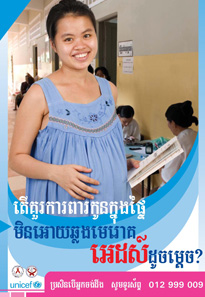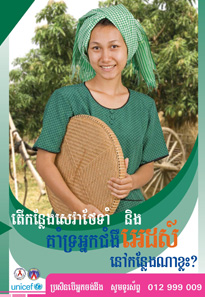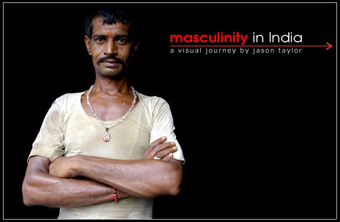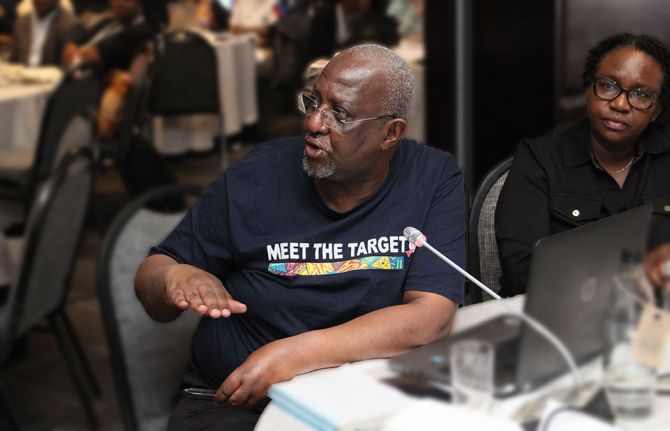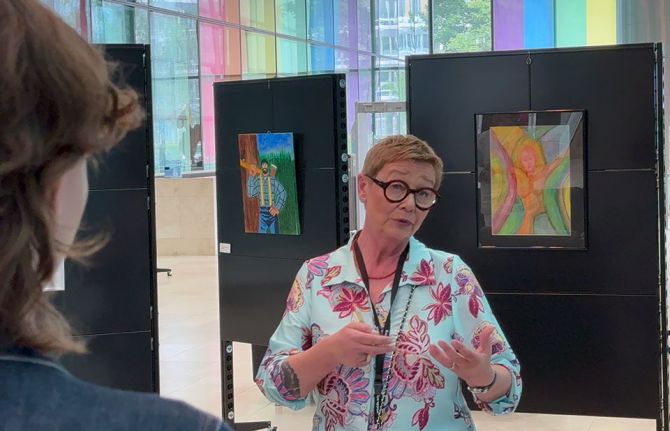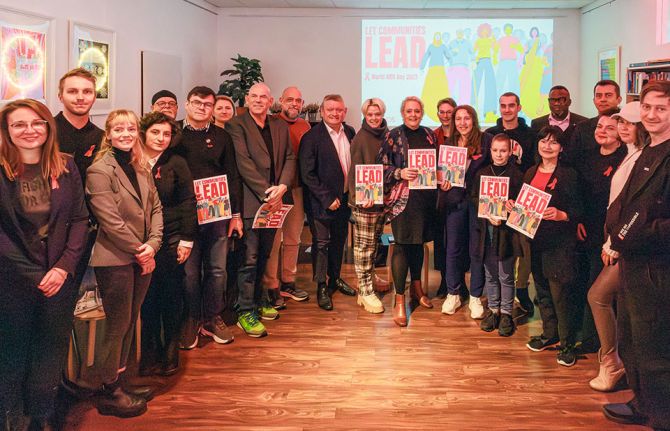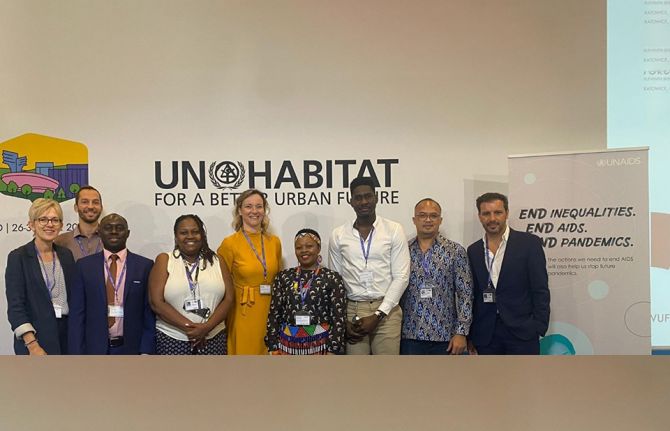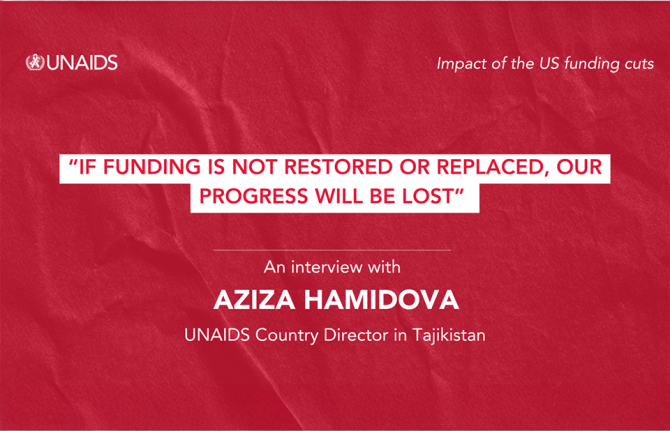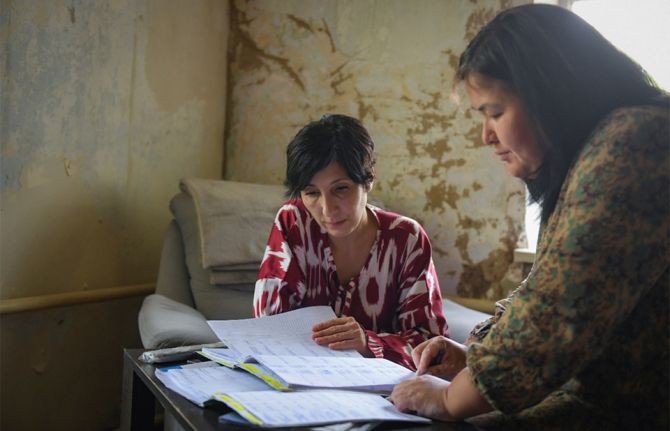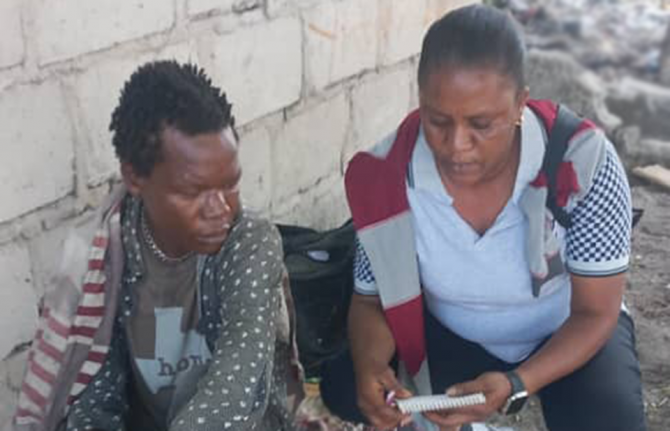
Feature Story
Cambodia’s HIV Hotline – advice and counselling just a phone call away
27 September 2006
27 September 2006 27 September 2006When young housewife and mother Kiri* learned she and her young son had tested positive for HIV, she didn’t know where to turn. “I had so many problems hidden in my heart. I didn’t dare tell my problems to anyone. Keeping this secret from people made me so distressed that sometimes I wanted to kill myself to escape from this suffering,” she said.
But Kiri found strength and support by picking up the telephone. She dialled the special ‘Inthanou’ (the Khmer word for ‘Rainbow’) hotline – a unique free, anonymous and confidential telephone counselling service established by a local NGO in 2000 to provide vital HIV information, support, counselling and referral – and help was at hand.
“After contacting the Inthanou hotline, I felt relieved and much less distressed after discussing my long-hidden problems. Now I can express my feelings to someone without any fear because: Firstly: No one knows who I am. Secondly: The conversation is confidential. Thirdly: I can discuss issues concerning my personal health problems and receive good advice and encouragement,” she explained.
Kiri is one of many benefiting from the Inthanou hotline. Since its creation in August 2000, the initiative has reached almost 300,000 people, most of them aged between 15 and 24.
The hotline is the result of a partnership with a telephone company in Cambodia, which provides two free telephone lines that are available in all of the county’s provinces. Funded by UNAIDS Cosponsor organization UNICEF, the French Embassy and other donors, the hotline runs six days a week from 11:00 to 20:00 and receives an average of 200 calls per day. In 2005 the hotline received a total of 63,228 calls.
Inthanou employs nine trained counsellors who provide information on HIV and reproductive health and when necessary refer callers to Voluntary Counselling and Testing Centres, as well as other medical services including Sexually Transmitted Infection clinics, access to treatment and care, and networks of people living with AIDS for psychosocial support.
“The hotline is not only providing information but it is also referring services that are available in the country. In this way the hotline is making a real impact on people’s lives, and is making a difference,” said Fabrice Laurentin, Project Officer for UNICEF Cambodia.
For Kiri, referrals from the hotline have led to her being able to access antiretroviral treatment from a local NGO. For others, the hotline has had equally positive impacts such as referrals which have lead to people living with HIV being able to access small grant funding to set up businesses.
The hotline is regularly promoted through various media, particularly TV and radio as well as via advertisements in magazines, t-shirts, key-rings and pamphlets that are widely distributed. In 2004 a special poster campaign was conducted featuring some of the country’s top sporting stars. In August 2006, the National AIDS Authority and UNICEF launched another special poster campaign promoting greater awareness of HIV among young women and encouraging them to use the free Inthanou HIV hotline.
“I really hope that this campaign will reduce women’s shyness about AIDS-related issues and encourage them to call the hotline,” said Dr. Loun Monyl, Inthanou Coordinator.
Inthanou also has a web site (www.inthanou.org) which provides online information on HIV and prevention and treatment services, as well as useful advice and testimonies of people living with HIV and other members of the public who have accessed the hotline for more information and assistance.
One young man tells his story on the web site: “I have had sex with my closest friend and I rarely thought about using condoms. I believed that having sex with a man was safe,” he explained.

One day as he was reading a magazine he came across Inthanou’s hotline number, advertising that the hotline provides anonymous and confidential information related to HIV and STDs. He called the hotline and counsellors advised him that having unprotected sex with a male partner, is a high risk behaviour for transmission of HIV and STDs. The counsellor gave him helpful advice about how to reduce the risk of HIV infection. Having consulted the hotline, he acknowledges that the hotline counsellor gave him important information about HIV. “I am now interested in finding out more about issues related to health and HIV. I often call Inthanou counsellors when I have questions,” he said.
“Ithanou is reaching out to all sectors of the population. Its anonymous and confidential service makes it easier for people to start talking about issues that are often taboo. In this way it is encouraging dialogue on issues of HIV and STIs and is helping break down stigma and discrimination,” said Jane Batte, Social Mobilization and Partnerships Advisor, UNAIDS Cambodia.
"You can protecty yourself against HIV, use condoms... If you want to know more about HIV and AIDS, please call 012 999 008/012 999 009" - Poster from the 2004 campaign uses famous Cambodian boxing star to raise awareness.
The hotline aims to build on its current service and, with additional funding, hopes to continue to answer tens of thousands of calls and refer at least 12,000 callers to appropriate government and NGOs medical and non-medical facilities every year.
“We want to reach out and make a difference to as many people as possible. With Inthanou, help is just a phone call away,” said hotline Coordinator Dr Monyl.
According to the UNAIDS Global Report 2006, at 1.6%, adult national HIV prevalence in Cambodia was one-third lower in 2005 than in the late 1990s—due mainly to a combination of rising mortality rates and HIV prevention efforts that helped reduce unprotected paid sex. However, the country is still burdened with one of the worst epidemics in Asia with women constituting a growing share of people living with HIV – an estimated 47% in 2003, compared with 37% in 1998.
*names have been changed to protect identity
Testimonials used in this story appeared first on the Inthanou web site – http://www.inthanou.org
Related links
http://www.inthanou.org
http://www.unicef.org
|
|
"Do you know how to protect your baby from HIV? If you want to know call 012 999 009"
Poster from the 2006 UNICEF / National AIDS Authority poster campaign targets pregnant women. |
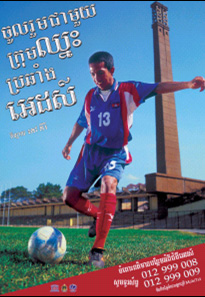 |
"Be part of the winning team against HIV/AIDS... If you want more information about HIV/AIDS, please call 012 999 009/012 999 008" Poster from the 2004 campaign uses a famous Cambodian football player to raise awareness. |
 |
"Someone with HIV can swim with me...If you want to know more about HIV and AIDS, please call 012 999 008/012 999 009" Poster from the 2004 campaign uses a famous Cambodian swimmer to raise awareness. |
|
|
“Where to access care and support related to HIV and AIDS? If you want to know, please call 012 999 009”
Poster from the 2006 UNICEF / National AIDS Authority poster campaign targets farm worker |
 |
"Run faster than AIDS, use condoms... If you want more information about HIV/AIDS, please call 012 999 009/012 999 008" Poster from the 2004 campaign uses a famous Cambodian runner to raise awareness. |
 |
“Where to do an HIV test? If you want to know, call 012 999 009” Poster from the 2006 UNICEF / National AIDS Authority poster campaign targets female workers |
Related

Feature Story
HIV: ‘Risks and Responsibilities’
25 September 2006
25 September 2006 25 September 2006Despite evidence establishing male-to-male sex as one of the driving forces of HIV transmission in Asia and the Pacific, only a few HIV interventions are strategically focusing on prevention, treatment, care and support for men who have sex with men in the region.
The need to build and strengthen programmes for men who have sex with men was addressed at the Male Sexual Health and HIV in Asia and the Pacific International Consultation, held in New Delhi from September 23 to 26, 2006.
The theme of the Consultation ‘’Risks & Responsibilities’’, signifies the increased risks that men who have sex with men face through sexual practices and cultural vulnerabilities, and the risks of not addressing these with adequate, appropriate and sufficiently funded HIV prevention, treatment care and support interventions. This also flags the responsibilities of men for protecting themselves and their partners, and the responsibilities of governments, donors and other stakeholders in ensuring resources and environments that enable good-quality HIV programmes and services for prevention, treatment, care and support.
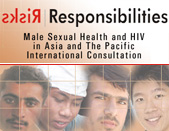
The International Consultation brought together governments, policy-makers, donors, researchers, grassroots and community based organisations across Asia and the Pacific to provide a space for dialogue and learning, to enable expansion, strengthening and scaling up of strategies addressing male sexual health and related HIV vulnerabilities. In addition, the consultation will provide an opportunity to inform and develop strategic advocacy initiatives and deliberate on key policies related to these issues.
![]() Visit the "Masculinity in India" website by Jason Taylor (flash, 491Kb)
Visit the "Masculinity in India" website by Jason Taylor (flash, 491Kb)
Speeches
23 September 2006
Statement by Most Reverend Desmond Tutu, Anglican Archbishop Emeritus of Cape Town
23 September 2006
Speech by Purnima Mane, Director, Policy, Evidence and Partnerships UNAIDS
23 September 2006
Opening speech by JVR Prasada Rao, Director, Regional Support Team UNAIDS
Related links:
Risks and Responsibilities , Male Sexual Health and HIV in Asia and the Pacific International Consultation
Related

Feature Story
UNITAID launched
20 September 2006
20 September 2006 20 September 2006
For many years, the international community has been looking for new tools to ensure sustainable financing for development and the fight against hunger and poverty. In this spirit, Brazil, Chile, France, Norway and the United Kingdom have taken the initiative in creating UNITAID, an international drug purchase facility, which will help scale up access to drugs and diagnostics to fight AIDS, malaria and tuberculosis for people who need them most in developing countries. This new initiative is funded primarily by innovative financing mechanisms such as the tax contribution on air tickets.
UNITAID was officially launched on Tuesday 19 September on the day of the opening of the 61st session of the General Assembly of the United Nations. The event was opened with a statement by UN Secretary-General Kofi Annan, followed by a series of statements by Brazilian President Luiz Inacio Lula da Silva, French President Jacques Chirac, Norwegian Prime Minister Jens Stolenberg, Chilean Foreign Minister Alejandro Foxley Rioseco and British Minister for Development Gareth Thomas. Congolese President Sassou N’GUESSO spoke in his capacity as Chairman of the African Union.
“UNITAID is a model of its kind for many reasons. It is an approach that can be made to work rapidly. It is flexible, in that more countries can easily join the original members. And it is a lean mechanism which complements the existing global architecture for health, inside and outside the UN system,” said the UN Secretary General at the opening.
UNITAID is the culmination of long efforts on the part of the international community to mobilize a portion of resources generated by globalization to benefit development.
In 2004, over a hundred countries acceded to the New York Declaration on Action against Hunger and Poverty and 79 countries endorsed the Declaration on Innovative Sources of Financing for Development that was adopted on 14 September 2005 at the United Nations in New York.
The Paris Conference, held on 28 February and 1 March 2006, resulted in the establishment of a pilot group of 44 countries that committed to work on implementing such financing. It was at the end of the Paris Conference that France proposed to create the international drug purchase facility.
“New innovative sources of financing are absolutely necessary,” said UNAIDS Executive Director Dr. Peter Piot on the occasion of the Paris meeting. “The demand for ARVs will constantly rise in the next few years. More and more people will get sick and more and more people will know they have HIV. That’s why it’s so important that we develop long term sustainable funding mechanisms which will allow us to continue treating people in 20 or 40 years,” he said.
At the High Level Meeting on AIDS that took place at the UN Headquarters in New York on 2 June 2006, Brazil, Chile, France and Norway drafted a Joint Declaration on UNITAID outlining its mission, key principles and objectives. Since then, the founding countries and partner organizations have identified priority activities for each disease and determined the way in which UNITAID is to operate.
As of today, 19 of the 44 pilot group countries have taken initial steps to introduce an air-ticket solidarity levy: Brazil, Chile, Cambodia, Cameroon, Congo, Côte d’Ivoire, Cyprus, France, Gabon, Guinea, Jordan, Luxembourg, Madagascar, Mauritius, Mali, Nicaragua, Norway, South Korea and the United Kingdom.
Chile, Côte d’Ivoire, France, Gabon and Mauritius are already implementing a voluntary contribution mechanism. Other countries are preparing to join the UNITAID effort.
The United Nations system is working closely with UNITAID to support the initiative as it moves forward. UNAIDS’ Cosponsor the World Health Organization will host the Fund and the Secretariat of UNITAID.
At its last meeting in June 2006, UNAIDS’ governing body expressed its support for UNITAID as an example of innovative financing. UNAIDS has provided advice and support throughout the conception and development of the initiative and will continue to work with UNITAID, particularly on facilitating relations within the UN system.
Related links
Read the Secretary General’s opening statement
Read the document describing the UNITAID initiative
Visit the UNITAID web site
WHO statement: WHO welcomes launch of UNITAID
February 2006: Feature story - ‘Innovative AIDS funding takes off’

Feature Story
Fighting stigma against sexual minorities in Latin America
19 September 2006
19 September 2006 19 September 2006Marcela Romero became a woman in heart, soul and body at the age of 17. This decision changed her life completely. No longer would ‘Marcelo’ (her name at birth) be the favourite uncle or pride of the family. Instead Marcela faced scorn and rejection.
“Knowing that your family wishes you had never existed or listening to the constant question what did I do to have a person like this in the family is very painful,” Marcela explained.
After having to drop out from school in Argentina due to reaction to her new appearance, Marcela was forced to sell sex to survive financially. During this time, Marcela became HIV positive.
Marcela’s experiences are typical of transsexuals in Latin America and other parts of the world as they face rejection from their families, marginalization within wider society and other forms of stigma and discrimination.

Marcela Romero (right of photograph), Coordinator of the Latin American Transsexual Network (REDLACTRANS)
“This is the reality of the gay, lesbian and transsexual population in Latin America. We are permanently treated as fascinating objects for investigation or contempt and not as individuals with rights,” said Marcela, explaining that despite her wish to be considered a woman, she is still obliged to carry and present her male identification papers to keep within the country’s law. In Latin America, stigma and discrimination of sexual minorities often goes hand in hand with HIV-related discrimination.
“Sexual violence is a reality for many sexual minorities and often sex work is the only viable option to make a living for transgender and transsexual people who are marginalized in mainstream society. Unless HIV prevention and stigma eradication programmes are designed by and for these communities they will continue to be more vulnerable to HIV,” said UNAIDS Head of Civil Society Partnerships, Andy Seale.
Marcela is working hard with others in the same situation as her to respond to and reduce the kind of stigma and discrimination she faces every day. As coordinator of the Latin American Transsexual Network (REDLACTRANS), she recently took part in a meeting in Brazil, in which other representatives from more than 20 Latin American countries gathered to address the issue of discrimination against sexual minorities and its effects on the AIDS response.

(right to left): Dr Pedro Chequer, UNAIDS Country Coordinator for Argentina, Chile, Uruguay and Paraguay; Marcela Romero, Coordinator of the Latin American Transsexual Network (REDLACTRANS)
Within the discussions at the meeting, a strategic guidebook to help fight discrimination against sexual minorities, and reduce its impact on HIV, was presented for discussion. “This guidebook will be a useful instrument for countries, especially those that lack on legislations and laws that ensure the basic human rights to these important populations,” said Pedro Chequer, UNAIDS Country Coordinator for Argentina, Chile, Uruguay and Paraguay. More than 80 countries around the world, especially in Asia, Africa, Central America and the Caribbean, currently punish homosexuality as a crime.
The meeting was an initiative of the Horizontal Technical Cooperation Group (HTCG), that comprises more than 21 Latin American countries, and the UNAIDS Regional Support Team for Latin America. The guidebook is expected to be ready for distribution later this year.
“We are committed to stopping the crimes and abuses against gay, lesbian and transsexual populations which can lead to a higher HIV risk. This goal can only be achieved through public policies that respect sexual orientation and human rights,” said Carlos Passarelli, HTCG’s Joint Director.
Arturo Diaz, from the Mexican non-governmental organization, Letra S, stated that this type of discrimination “affects the daily lives of the gay, lesbian and transsexual populations in personal, emotional and professional aspects, as well as health”.
As stated in the Declaration of Commitment on AIDS, UNAIDS is working on initiatives to join efforts with governments, civil society and the media of all the Latin American countries to fight stigma and discrimination through coordinated action as part of a wide response to the AIDS epidemic.
The path ahead is long, but as Marcela has seen, stigma and discrimination can be broken down gradually, moving towards the ultimate goal of total eradication. “Before only my best friend would accept me, now my Mum has started to come around as well,” she said. “Things are changing – it’s little by little, but they are changing for the better.”
Related links
Horizontal Technical Cooperation Group of Latin America and the Caribbean on HIV/AIDS
Letra S
PAHO - HIV/AIDS-Related Stigma and Discrimination in the Health Sector
PAHO - Estigma y Discriminación por el VIH/SIDA en el Sector Salud
PAHO - Time to Stop Homophobic Crimes in Latin America and the Caribbean
PAHO - Es hora de poner fin a los crímenes homofóbicos en AMÉrica Latina y el Caribe
Related

Feature Story
Church strengthens role in AIDS response
15 September 2006
15 September 2006 15 September 2006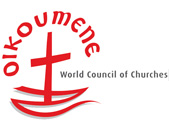
“Every person living with HIV should have access to the treatments made available by medical science and churches must advocate for this to happen,” was the powerful declaration that came out of the first meeting of the current Central Committee of the World Council of Churches (WCC).
The declaration was part of a ‘Statement on churches’ compassionate response to HIV and AIDS,’ which was adopted by the Central Committee (the main decision-making body of the WCC) in Geneva at the beginning of September. The Statement on AIDS is the third of its kind to be issued by the Committee since 1986.
“It is commendable that the Central Committee has produced such a strong statement on churches’ response to HIV,” said Calle Almedal, UNAIDS Senior Adviser, Partnerships Development. “The statement is substantive and will encourage dialogue within the Church on many difficult AIDS-related issues.”
The ecumenical movement has been engaged in the AIDS response for over 20 years. As early as 1986 the executive committee of the WCC cautioned, “Churches as institutions have been slow to speak and to act, that many Christians have been quick to judge and condemn many of the people who have fallen prey to [HIV]; and that through their silence, many churches share responsibility for the fear that has swept our world more quickly than the virus itself.”
In the newly adopted Statement, the Committee calls on churches and Christians to promote greater involvement of people living with HIV in churches’ response to the epidemic and to adopt inclusive workplace policies for people living with HIV. It also acknowledges that, “Many of us (churches) have been complicit in stigmatizing and marginalizing people living with HIV by their silence, their words and their deeds.”
The statement also recognises that churches need to promote open discussions on issues related to sexuality, gender-based violence and intravenous drug use. It also focuses on areas of churches’ response to AIDS where there is continual disagreement and called for reflection on churches’ response to those who engage in high risk sexual activity or drug use including the appropriate means of prevention.

Photo credit: World Council of Churches.
Rev. Samuel Kobia addressing the Indigenous Peoples'
pre-Assembly meeting, February 2006
“Churches in particular need to correct the flawed theology and practices that equate sin with disease and that put morality over compassion," said Reverend Dr Samuel Kobia, WCC general secretary.
UNAIDS supports churches’ efforts to reach out to their own membership to make all churches safe places for people living with HIV to talk openly without fear of stigma and discrimination. UNAIDS also supports churches in their outreach efforts in comprehensive prevention, care and support for all affected groups and recognizes that their vision on working with AIDS is with a very long term perspective. Furthermore UNAIDS gives technical assistance on AIDS to, and collaborates with, churches working on HIV related theology, and sees this as sustainable development in the AIDS response.
In an effort to encourage churches to be more inclusive of people living with HIV, the WCC recently teamed-up with key partners in the AIDS response including the African Network of Religious Partners living with or personally affected by HIV, the Global Network of People Living with HIV and the International Community of Women Living with HIV on a campaign to provide guidance to churches in encouraging the active participation of people living with HIV in church life.
The WCC's Ecumenical HIV/AIDS Initiative in Africa (EHAIA), launched in 2002 has been encouraging churches to become ‘HIV competent’ in order to; indicate clearly that stigma and discrimination against people living with HIV is against the will of God; understand fully the severity of the AIDS epidemic in Africa; take into consideration pastoral, cultural and gender issues; and use its resources and structures to provide care, counselling and support for those affected.
Dr Manoj Kurian, the WCC programme executive for health and healing, said “The EHAIA is responding to the burning needs of people. Through its five EHAIA offices the WCC is making it possible for church leaders and their congregations to speak honestly about AIDS, formulate relevant liturgy and theology, and to act practically in response.”
The World Council of Churches brings together more than 340 churches, denominations and church fellowships in over 100 countries and territories throughout the world and represents more than 560 million Christians. For more information visit http://www.oikoumene.org/
Related links:
The Central Committee of the World Council of Churches "Statement on churches' compassionate response to HIV and AIDS"

Feature Story
Tajikistan and Kyrgyzstan: a window of opportunity
14 September 2006
14 September 2006 14 September 2006
While the AIDS epidemic in Eastern Europe and Central Asia continues to grow and is affecting more and more societies in this region, the epidemics in Tajikistan and Kyrgyzstan have remained relatively small.
In 2005 UNAIDS estimated that 4,900 people were living with HIV in Tajikistan and 4,000 in Kyrgyzstan. That same year, it was estimated that AIDS claimed less than 100 lives in each country.
During her visit to the region in July 2006, the UN Secretary General’s Special Envoy on HIV/AIDS in Asia and the Pacific Dr. Nafis Sadik, congratulated both countries for their efforts to prevent the spread of HIV, saying that with continued national leadership and international assistance Tajikistan and Kyrgyzstan had a real possibility getting ahead of the epidemic.
However, despite the relatively low numbers of people living with HIV and of AIDS-related deaths in both countries, recent surveys show evidence of growing numbers of HIV infections among injecting drug users, prisoners and sex workers.
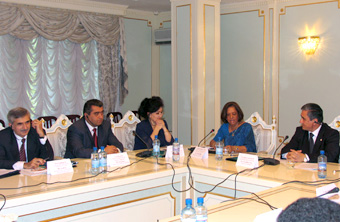
(left to right): Dr Amanullo Gaibov, Secretary of National Coordination Committee on HIV/AIDS, Tuberculosis and Malaria of the Republic of Tajikistan; Dr Zievuddin Avgonov, Deputy Minister of Health of the Republic of Tajikistan; Dr Rano Abdurakhmanova, Director of Department on Social, Health, Women and Family Affairs, President’s Office of the Republic of Tajikistan; Dr Nafis Sadik, UN Secretary General’s Special Envoy on HIV/AIDS in Asia and the Pacific; Dr Nusratullo Faizulloyev, Minister of Health of the Republic of Tajikistan (Chair of the Partnership Forum)
“This data is very alarming, since there are many factors that contribute to the spread of the HIV epidemic,” said the Minister of Health, Dr. Faisullaev during a presentation of the country’s National Plan on AIDS. “If we continue the way we do the HIV epidemic will become generalized,” he added.
Underlining her call for continued comprehensive efforts to curb the epidemic, Dr. Sadik stressed that HIV prevention must be the mainstay of the national response, and urged both governments to commit to ensuring that a wide range of prevention programmes are made available to the general population through high-level advocacy and education at the national and regional level. “To be successful, HIV prevention must make use of all approaches known to be effective, not implementing exclusively one or a few select actions in isolation,” said Dr. Sadik.
Dr Sadik also emphasized that all stakeholders must be involved in the response to AIDS, especially with regard to prevention activities. In Tajikistan she met with a group of women’s NGOs and with a group of people living with HIV to learn more about their situation, what they need and how they can contribute to the AIDS response.
Acknowledging that faith based organizations have a critical role to play, Dr Sadik also met with the rector of the Tajik Islamic University to advocate for greater involvement of faith based organizations. She also discussed with him the importance of preventing and reducing the stigmatization of people living with HIV, promoting tolerant attitudes, the protection of women’s rights in reproductive health and the prevention of sexually transmitted diseases.
(left to right): Dr Nafis Sadik, UN Secretary General’s Special Envoy on HIV/AIDS in Asia and the Pacific and Mr Felix Kulov, Prime-Minister of Kyrgyz Republic.
“Tajikistan and Kyrgyzstan provide living examples that prevention works to contain the epidemic,” said Dr Sergei Furgal from UNAIDS European Regional Support Team in Geneva. “Their efforts should be acknowledged and some countries may find lessons to draw from their experience with HIV,” he added.
Related links
More on Tajikistan
More on Kyrgyzstan
Related

Feature Story
China’s Olympic effort to raise AIDS awareness
12 September 2006
12 September 2006 12 September 2006In 2008, top athletes from around the world will gather in China to attempt to run, jump, swim and pole-vault themselves into the records book at the XXIX Olympic Games. And as China warms up to host the games, building of stadiums and amenities across the country, a parallel initiative is taking place to raise awareness about HIV among the thousands of construction workers involved in preparing Beijing for the Olympics.
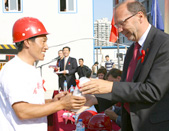
More than 200 workers gathered at one such awareness raising activity held recently at a construction site in Beijing. Through exhibitions and the distribution of AIDS-related pamphlets, posters, playing cards and condoms, workers were able to find out information about HIV and how to protect themselves and others. A special question and answer session, informative entertainment and other awareness raising activities were conducted.
Organized by the China AIDS/STD Prevention and Control Foundation and the Beijing Health Bureau, the event involved special presentations by UNAIDS Executive Director Peter Piot, the Beijing Construction Commission, a worker on one of the sites and the China AIDS Prevention Foundation.
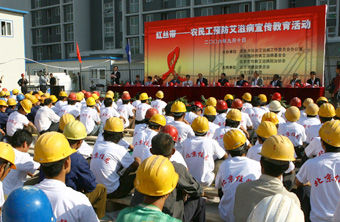
“Targeting workers involved in the construction of Olympic venues as well as workers at the many other building sites all over China is an extremely important and big task. Migrant workers are often particularly vulnerable and at risk as they are away from their families for very long periods of time and can lack the information and skills necessary to protect themselves from HIV,” said Mr. Joel Rehnstrom, UNAIDS Country Coordinator in China.
The initiative for raising awareness among migrant workers was launched in 2005 by the State Council AIDS Working Committee office together with 12 government ministries. The initiative is being rolled out over 20 Olympic sites over the next six months. With many construction workers coming from different parts of China specifically to build the facilities, the events aim to reach out to as many people as possible from a wide variety of communities and backgrounds and to highlight sport as a key arena for promoting HIV prevention activities, particularly among young people.
In 2004, UNAIDS signed a Memorandum of Understanding with the International Olympics Committee, combining efforts to enhance the role of sports organisations in the fight against AIDS at community and national levels, and to organize AIDS awareness activities with coaches, athletes and sports personalities.
Photo credit: UNAIDS/Li Mingfang
Related links
UNAIDS Executive Director visits China 7-12 September
UNAIDS China website
Related

Feature Story
China province project reaches out to young people
06 September 2006
06 September 2006 06 September 2006The guidebooks call it ‘remote’, ‘undiscovered’ – China’s south-western province of Guizhou is home to some examples of extreme natural beauty including China’s largest waterfall, the ‘Huangguoshu’ and the Zhijin Caves, famous for their massive-scale stalagmite stone pillars.
But despite its remote location and idyllic surroundings, the province, like every other in China, is increasingly affected by HIV. From a few individual reported cases in 1993, it is currently estimated that about 37,000 people in Guizhou are living with HIV. There are signs of the epidemic becoming progressively generalized and increasingly women are becoming infected.
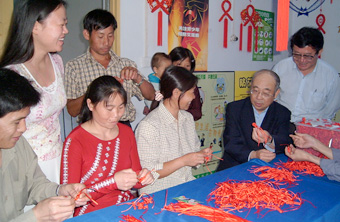
With hope and help – A self-help group for people living with HIV in Guizhou
A joint HIV prevention and care project, run by Guizhou provincial authorities, and UNAIDS` Cosponsor UNICEF is making some headway towards tackling the growing figures and at the same time involving people and groups from all sectors in the AIDS response. Established in 2001, the project focuses particularly on young people, tackling the often difficult issue of injecting drug use and its crossover with HIV, as well as providing care and support for people living with HIV.
“The initiative contains three key areas – development of a strategic plan on AIDS involving high-level advocacy and media mobilization; HIV prevention among children and young people in and out of school and within drug rehabilitation centres; and care and support to children living with HIV and their families,” said Christian Voumard, UNICEF Representative and chairman of the UN theme group on AIDS in China.
The project aims to build and involve all key officials and provincial groups in the AIDS response. Vice Provincial Governor of Guizhou Wu Jiafu underlines how the initiative has helped bring people together. “As government officials, we now know how we can work together with multiple sectors to confront AIDS and support people living with and affected by HIV. This network is now implementing the national policies and local policies to support young people, people living with HIV and their families to fight against the disease and its social impact,” he said.
“Though the resources here are very limited, we’re confident that we can get ahead of the HIV epidemic with the participation of all these young people and people infected and affected,” he added.
Results so far have been extremely encouraging. Provincial policies on HIV have been put in place and training sessions with authorities and project managers are already underway. Since the project’s inception, 45 high schools have developed curriculum on HIV and drug use prevention in eight of the province’s prefectures, reaching more than 70,000 children and young people.
Voluntary testing and counselling services have been set up within seven drug rehabilitation centres across the province.
“By knowing my HIV status and with all the knowledge of prevention of HIV, I will stop sharing needles with my friends and engaging in high risk sex,” said one young man at the Tongren prefecture drug rehabilitation centre.
Through the initiative, gradually people living with HIV are being brought to the forefront of the response in the province. A number of self-help groups of people living with HIV have been developed with the participation of 50 people living with HIV. More than 100 family members and 26 children and their families participated in care and support campaigns in the prefectures of Guiyang and Tongren, receiving community based care for family life and schooling.
“I never imagined it could be possible that authorities and big organizations would care about us –people living with HIV—and our children,” said one man living with HIV from Tongren prefecture who has been involved in the programme. “I lost my hope because of the pain of disease, social discrimination and poverty, but this is helping to restore the hope by supporting me and my children.”
UNICEF was the first major donor on AIDS in Guizhou province and provided some of the ground work for other donors’ work in the area. Programmes supported by the US Center for Disease Control and the Global Fund to Fight AIDS, TB and Malaria (Round 4) have since benefited from this in their support to Guizhou.
UNICEF will continue to support the project in their new 2006-2010 programme and activities will be expanded to include prevention of mother to child transmission of HIV (PMTCT) and increasing care and support for children affected by AIDS.

The joint project in Guizhou is focusing particularly on young people
“This programme has been an example of bringing together a variety of different groups within the AIDS response – and crucially invovles young people and people living with HIV,” said UNAIDS Country Coordinator for China, Joel Rehnstrom.
“We are seeing the project help reduce numbers of new infections, as well as break down the barriers and taboos of involving people living with HIV – which in turn is breaking down stigma and discrimination related to HIV.”
UNAIDS Executive Director Peter Piot is visiting China from 7 – 12 September to encourage continued leadership and commitment and to mobilize a truly multi-sectoral response to AIDS in China. As part of his visit, Dr Piot is participating in a three-day mission to Guizhou, visiting the Hui Long community and Zhijing County. Dr Piot will meet with representatives of provincial government and city leaders and visit various key sites that focusing on HIV and drug use.
Related links
UNICEF China website
More on China
Related

Feature Story
Summer caravan drives forward HIV prevention efforts in Morocco
04 September 2006
04 September 2006 04 September 2006Caravanning in Morocco has taken a whole new meaning with a special summer caravan travelling around the country in a quest to raise awareness about HIV prevention among young people.
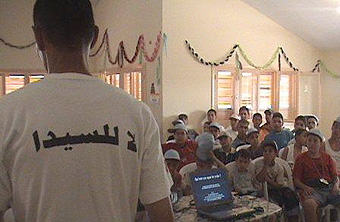
Parking at some of Morocco’s most popular resorts from the Atlantic and Mediterranean coasts to the remote Atlas Mountains sites, the caravan has visited 19 youth campsites where more than 7000 young men and women have stayed during their holidays.
The SIDAmobile initiative’s caravan is run by the Moroccan-based organization ‘Association de Lutte Contre le SIDA’ in Morocco (ALCS) and the Ministry of State for Youth.
“In Morocco, we are very sensitized to the importance of intensifying prevention efforts towards young people because they are particularly vulnerable to HIV infection and also because they represent the future,” said President of the ALCS, Hakima Himmich.
At each stopover, the facilitators –all doctors who have been specially trained to work with young people on the issue of HIV— initiated open and frank discussions about sex and sexually transmitted diseases (STDs). In less than a month, the caravan distributed some 35 000 flyers on HIV and 15 000 condoms were given to young people at their request. Also more than 700 people asked for, and received, a confidential HIV test with counselling.
“It’s the first time I have done an HIV test”, said a participant of the summer camp Assilah Corniche. “There is nothing wrong about it but it’s not very common in my neighborhood to be open about sex, especially for girls.”
“It’s good to learn about HIV and how it spreads,” added another young woman in the same campsite. “Now I know how people become infected with HIV and I learned how to protect myself,” she added.
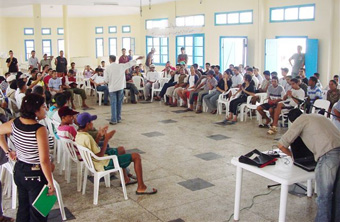
In Morocco, only an estimated 12% of women aged 15 to 24 are able to identify ways to prevent HIV. “We are trying to create an environment that enables people, especially the younger ones, overcome some of the taboo associated with sex and give them an opportunity to talk about their concerns and ask questions,” said My Ahmed Douraidi from ALCS and coordinator of the SIDAmobile initiative. “This is the first step for any HIV prevention work,” he added.
Praising this grass root prevention initiative and recognizing the importance of high level leadership and commitment, Kamal Alami from UNAIDS office in Morocco said that “HIV prevention on the ground is far more effective when programmes are tailored to audiences”.
“In Morocco, the high level support we receive creates many opportunities, such as music festivals, popular celebrations etc. that we can seize to disseminate prevention messages among young people,” he added.
The summer caravan stems from a collaborative effort between ALCS, the State Secretary for Youth and the United Nations Population Fund (UNFPA)
Related links
United Nations Population Fund (UNFPA)
Association de Lutte Contre le SIDA (ALCS)

Feature Story
Universal access: New push from African civil society
01 September 2006
01 September 2006 01 September 2006UNAIDS welcomes the African Civil Society Coalition as a significant stakeholder in the process to move towards universal access by 2010.
Thirty representatives from the African Civil Society Coalition on HIV and AIDS attended the International AIDS Conference in Toronto to push forward the agenda on universal access to prevention, treatment, care and support for all Africans.

The African Civil Society Coalition was recently established to work on key advocacy challenges in Africa, review AIDS strategies and provide a platform for energising HIV and AIDS campaigns by African civil society groups. The Coalition joins together a range of civil society groups including, women’s groups, youth networks, associations of people living with HIV, the media and faith based organisations.
The Toronto conference was an opportunity not only for the Coalition to promote the need to scale-up the response in Africa at an international level, but was also a chance to meet with other key actors to discuss ways forward and the active involvement and participation of African civil society in the decision making processes.
“It is extremely important that such a Coalition exists,” said UNAIDS’ Director of Country and Regional Support, Michel Sidibe. “It empowers small scale organizations and gives them more visibility at regional and international level”.
Midway through the conference, the Coalition met with the Joint United Nations Programme on HIV/AIDS (UNAIDS) to discuss practical steps for ensuring that the Coalition is fully involved in the process of setting national targets to scale up towards universal access to HIV prevention, treatment, care and support by 2010.

UNAIDS is urging countries to set up, through transparent and fully inclusive processes, ambitious national targets to move towards universal access. As agreed in the Political Declaration adopted in June at the 2006 United Nations High Level Review. “We believe that at this period in history, when the world seems to be united in the drive towards achieving universal access, African civil society groups must come together strongly to play critical roles in the national and regional responses,” said Omololu Falobi from the Nigerian non governmental organization, Journalists Against AIDS. “Civil society must play an active role with national governments, regional institutions such as the African Union and stakeholders such as UNAIDS in the movement to scale up the AIDS response,” he added.
Members of the Coalition are meeting in Mombassa, Kenya mid-September, to develop strategic directions for enhanced civil society participation in target-setting process and in monitoring accountability by African governments towards universal access benchmarks for 2008 and 2010.
UNAIDS encourages similar civil society networking initiatives around the world. “The movement to scale up towards universal access is a momentum that we have to seize together. Because mutual accountability will produce better results, we will seek every opportunity to build bridges between state and non state actors,” said Michel Sidibe.
The XVI International AIDS Conference, a biennial event, this year brought together some 24,000 participants from around the world to present the latest findings and share the latest evidence, ideas and lessons learned in AIDS research, policies and programmes.
Related links
UNAIDS at XVI International AIDS Conference

The partners of the African Civil Society Coalition on HIV and AIDS include:
AIDS Rights Alliance of Southern Africa
ActionAid International - Africa
African Council of AIDS Service Organisations (AfriCASO)
African Microbicides Advocacy Group (AMAG)
Central African Network of AIDS Service Organisations (CANASO)
Civil Society Network on HIV/AIDS in Nigeria (CISHAN)
CREDO for Freedom of Expression and Associated Rights
Eastern African National Network of AIDS Service Organisations (EANNASO)
Global Youth Coalition on AIDS (GYCA)
Journalists Against AIDS (JAAIDS) Nigeria
Network of African People Living with HIV/AIDS (NAP+)
Treatment Action Campaign (TAC)
Open Society Initiative for Southern Africa (OSISA)
Oxfam International
Panos Institute Global AIDS Programme
Southern African AIDS Information Dissemination Service (SAfAIDS)
Society for Women and AIDS in Africa (SWAA)
World AIDS Campaign

